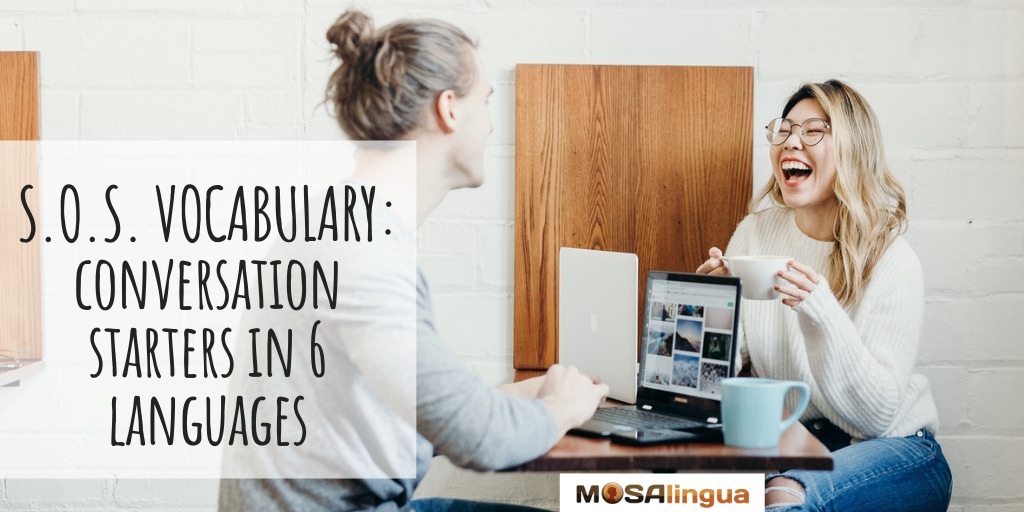Knowing how to start a conversation is some of the most important vocabulary to learn in any foreign language. There are lots of different ways to engage in conversation and make sure you’re on the same page as the person you’re speaking to. “I don’t understand,” “Can you repeat that?”, and “What is this called?” are super simple expressions, but they’ll get you a long way. Especially if you’re traveling to a country where English isn’t commonly spoken. Keep reading to learn how to get a conversation off the ground in 6 different languages: French, Spanish, German, Italian, Brazilian Portuguese, and Chinese.

How to Start a Conversation in a Foreign Language: Essential Conversation Starters in Spanish, French, and More
Making sure the person you’re speaking to understands you is the basis of any conversation in a foreign language. So when you’re traveling to a place where you don’t speak the local language very well, knowing how to check that your message is getting across can be a life-saver in lots of different situations. If you can say “Can you repeat that?”, “What is this called?”, or simply “Do you understand me?” in at least one of the languages in this article, it’ll be a big help in ensuring a smooth, valuable, and pleasant conversation.
Of course, knowing how to start a conversation is only, well, the beginning! Even if you learn all of the phrases down below by heart, you won’t necessarily know how to keep the discussion going. So, to learn more words and phrases, or to perfect your foreign-language skills, we recommend downloading a language-learning app focused on vocabulary, like MosaLingua. And to help you start to feel more comfortable in situations when you need to speak your target language, consider finding a language partner!
Check out these common conversation starters in Spanish, French, German, Italian, Brazilian Portuguese, and Chinese. (We couldn’t include every language in this article, but these 6—plus English—will allow you to communicate nearly anywhere you want to go!) We hope they’ll lead to some helpful and rewarding discussions in the near future!
Say “I’m American/English”
- 🇫🇷 French: Je suis américain(e)/anglais(e)
- 🇩🇪 German: Ich bin Amerikaner(in)/Ich bin Engländer(in)
- 🇧🇷 Portuguese: Eu sou americano(americana)/Eu sou inglês(inglesa)
- 🇮🇹 Italian: Sono americano(americana)/Sono inglese
- 🇪🇸 Spanish: Soy estadounidense/Soy inglés(inglesa)
- 🇨🇳 Chinese: 我是美国人 / 我是英国人 – wǒ shì měi guó rén, wǒ shì yīng guó rén
Say “I don’t understand”
- 🇫🇷 French: Je ne comprends pas
- 🇩🇪 German: Ich verstehe nicht
- 🇧🇷 Portuguese: Não entendi
- 🇮🇹 Italian: Non capisco / Non ho capito
- 🇪🇸 Spanish: No lo entiendo
- 🇨🇳 Chinese: 我不懂 – wǒ bù dǒng
Say “Do you understand me?”
- 🇫🇷 French: Me comprenez-vous ?
- 🇩🇪 German: Verstehen Sie mich?
- 🇧🇷 Portuguese: Você está me entendendo?
- 🇮🇹 Italian: Mi capisce?
- 🇪🇸 Spanish: ¿Me entiendes?
- 🇨🇳 Chinese: 你懂吗?- nǐ dǒng ma?
Say “Does anyone speak English?”
- 🇫🇷 French: Y’a-t-il quelqu’un qui parle anglais ?
- 🇩🇪 German: Spricht hier jemand Englisch?
- 🇧🇷 Portuguese: Há alguém aqui que fale inglês?
- 🇮🇹 Italian: C’è qualcuno che parla inglese?
- 🇪🇸 Spanish: ¿Alguien habla inglés?
- 🇨🇳 Chinese: 有人会说英语吗?- yǒu rén huì shuō yīng wén ma?
Start learning a new language today

Good news: we can help!
More good news: you can get started for free! Start your free trial now and for the next 15 days, take advantage of the most effective language learning method on the market!
Vocabulary flashcards, videos with subtitles, audiobooks, articles adapted to your level – with MosaLingua Premium (Web & Mobile), you’ll have access to all this and more. Get started right now. It’s free—and risk-free—to try!
Say “How do you say … in [target language]?”
- 🇫🇷 French: Comment dit-on … en [langue cible] ?
- 🇩🇪 German: Wie sagt man … auf [Zielsprache] ?
- 🇧🇷 Portuguese: Como se diz… em [idioma] ?
- 🇮🇹 Italian: Come si duce … in [lingua di arrivo]?
- 🇪🇸 Spanish: Cómo se dice … en [lengua de destino] ?
- 🇨🇳 Chinese: …[目标语言]怎么说?… – [mù biāo yǔ yán] zěn me shuō?
Say “What is this called?”
- 🇫🇷 French: Comment appelez-vous cela ?
- 🇩🇪 German: Wie nennen Sie das?
- 🇧🇷 Portuguese: Como é o seu nome?
- 🇮🇹 Italian: Come lo chiami questo?
- 🇪🇸 Spanish: ¿Cómo llamas a esto?
- 🇨🇳 Chinese: 这个怎么说?- Zhè ge zěn me shuō?
Say “What does … mean?”
- 🇫🇷 French: Que signifie … ?
- 🇩🇪 German: Was heißt…?
- 🇧🇷 Portuguese: O que significa…?
- 🇮🇹 Italian: Che significa…?
- 🇪🇸 Spanish: ¿Qué significa …?
- 🇨🇳 Chinese: …是什么意思?- …shì shén me yì si?
Say “Could you slow down, please?”
- 🇫🇷 French: Plus lentement, s’il vous plaît
- 🇩🇪 German: Langsamer, bitte
- 🇧🇷 Portuguese: Mais devagar, por favor
- 🇮🇹 Italian: Più piano/lentamente, per favore
- 🇪🇸 Spanish: ¿Puedes hablar más despacio, por favor?
- 🇨🇳 Chinese: 你可以说慢点儿吗?- nǐ kě yǐ shuō màn diánr ma?
Say “I don’t speak [target language] (very well)”
- 🇫🇷 French: Je ne parle pas (bien) [langue cible]
- 🇩🇪 German: Ich spreche kein/nicht so gut [Zielsprache]
- 🇧🇷 Portuguese: Eu não falo (bem) o [idioma]
- 🇮🇹 Italian: Non parlo (bene) [lingua di arrivo]
- 🇪🇸 Spanish: No hablo [lengua destino] (muy bien)
- 🇨🇳 Chinese: 我不会说[目标语言](我[目标语言]说得不好)- wǒ bú huì shuō [mù biāo yǔ yán] (wǒ [mù biāo yǔ yán] shuō de bù hǎo)
Say “I speak (a little) [target language]”
- 🇫🇷 French: Je parle (un peu) [langue cible]
- 🇩🇪 German: Ich spreche (ein bisschen) [Zielsprache]
- 🇧🇷 Portuguese: Eu falo um pouco de [idioma]
- 🇮🇹 Italian: Parlo (un po’) [lingua di arrivo]
- 🇪🇸 Spanish: Hablo (un poco) [lengua de destino]
- 🇨🇳 Chinese: 我会说(一点儿)[目标语言] – wǒ huì shuō (yì diǎnr) [mù biāo yǔ yán]
Dire “I think you misunderstood me”
- 🇫🇷 French: Vous m’avez mal compris
- 🇩🇪 German: Sie haben mich falsch verstanden
- 🇧🇷 Portuguese: Você me entendeu mal
- 🇮🇹 Italian: Lei mi ha capito male
- 🇪🇸 Spanish: Creo que no me has entendido
- 🇨🇳 Chinese: 我觉得你误会我了- wǒ jué de nǐ wù huì wǒ le
Say “Can you repeat that, please? / Say again?”
- 🇫🇷 French: Tu peux répéter s’il te plaît ? (informal)
- 🇩🇪 German: Kannst du das bitte wiederholen?
- 🇧🇷 Portuguese: Você pode repetir, por favor?
- 🇮🇹 Italian: Puoi ripetere per favore ?
- 🇪🇸 Spanish: ¿Me lo puedes repetir, por favor?
- 🇨🇳 Chinese: 你能重复一下吗/你能再说一次吗?- nǐ néng chóng fù yí xià ma?/nǐ néng zài shuō yí cì ma?
Say “I’m learning [target language]”
- 🇫🇷 French: Je suis en train d’apprendre [langue cible]
- 🇩🇪 German: Ich lerne [lZielsprache]
- 🇧🇷 Portuguese: Estou aprendendo [idioma]
- 🇮🇹 Italian: Sto imparando [lingua di arrivo]
- 🇪🇸 Spanish: Estoy aprendiendo [lengua de estudio]
- 🇨🇳 Chinese: 我正在学[目标语言] – wǒ zhèng zài xué [mù biāo yǔ yán]
There you have it! Now you know some common conversation starters in 6 foreign languages that will help you start communicating with people all over the world. Even if you don’t intend to reach fluency in any of these languages, you’ll still be able to use these handy phrases to get around more easily when traveling.
Take It Further
- COMING SOON — SOS Vocab: How to Say Hello and Other Greetings in 6 different languages
- COMING SOON — SOS Vocab: How to Say Thank You and Learn How to Be Polite in 6 different languages




Comments